period of my instruction — anything but half problems, hints and puzzles to solve for himself. For only then would he believe, when his own extraordinary capacity for grasping at the nature of things, would clearly show him that it must be so, since it dovetails with what HE conceives to be mathematically correct. If he accused — and so unjustly! — K.H. whom he really affections — of feeling "huffish" at his lack of reverence for him — it is because he built his ideal of my brother in his own image — Mr. Hume accuses us of treating him de haut en bas! If he but knew that in our sight an honest boot-black was as good as an honest king, and an immoral sweeper far higher and more excusable than an immoral Emperor — he would have never uttered such a fallacy. Mr. Hume complains (thousand pardons — "laughs" is the correct term) that we show a desire of sitting upon him. I venture to suggest most respectfully that it is absolutely vice versa. It is Mr. Hume who (again unconsciously and yielding but to a life-long habit) tried that most uncomfortable posture with my brother in every letter he wrote to Koothoomi. And when certain expressions denoting a fierce spirit of self-approbation and confidence which reached the apex of human pride, were noticed and mildly contradicted by my brother, Mr. Hume forthwith gave them another meaning and accusing K.H. of having misunderstood them, called him to himself puffed up and "huffish." Do I accuse him then, of unfairness, injustice or worse? Most decidedly not. A more honest, sincere or a kinder man never breathed on the Himalayas. I know actions of his
Letter №29
Letter №29 (ML-29)
Mahatma M. - A.P. Sinnett/A.O. Hume
October, 1881
Covers - 1. Pages - 18.
Page 11
of which his own family and lady are utterly ignorant of — so noble, so kind and grand, that even his own pride remains blind to their full worth. So that anything he might do or say, is unable to diminish my respect for him; but with all this, I am forced to tell him the truth; and while that side of his character has all my admiration, his pride will never win my approbation, — for which once more, Mr. Hume will not care one twopence, but that matters very little, indeed. The most sincere and outspoken man in India, Mr. Hume is unable to tolerate a contradiction; and, be that person Dev or mortal, he cannot appreciate or even permit without protest the same qualities of sincerity in any other than himself. Nor can he be brought to confess that anyone in this world can know better than himself anything that HE has studied and formed his opinion thereupon. "They will not set about the joint work in what seems to ME the best way," he complains of us in his letter to Olcott, and that sentence alone gives to us the key to his whole character; it gives us the clearest insight into the working of his inner feelings. Having a right — he thinks — to regard himself as slighted and wronged, in consequence of such an "ungenerous," "selfish" refusal to work under his guidance, he cannot help thinking himself at the bottom of his heart, as a most forgiving, generous man, who, instead of resenting our refusal is nevertheless "willing to go on in their (our) way." And this
Page 12
irreverence of ours for his opinions cannot be pleasing to him; and thus the feeling of this great wrong we do him rises, and becomes proportional to the magnitude of our "selfishness" and "huffishness." Hence his disenchantment, and the sincere pain he feels at finding the Lodge and all of us so much below the mark of his ideal. He laughs, for my defending H.P.B.; and giving way to a feeling unworthy of his nature, very unfortunately forgets that his is just the disposition to warrant friends and foes at calling him "protector of the poor" and like names, and that his enemies among others, never fail to apply such epithets to himself; and yet, far from falling upon him as an insult, that chivalrous feeling which has ever prompted him to take the defence of the weak and the oppressed and to redress the wrongs done by his colleagues — as in the last instance of the Simla municipality row — it covers him with a garment of undying glory spun out of the gratitude and affection for him of the people he so fearlessly defends. Both of you labour under the strange impression that we can, and even do care for anything that may be said or thought of us. Disabuse your minds, and remember that the first requisite in even a simple fakir, is that he should have trained himself to remain as indifferent to moral pain as to physical suffering. Nothing can give us personal pain or pleasure. And what I now say is, rather to bring you to understand us than yourselves which is the most difficult science to learn. That Mr. Hume's intention — prompted by a feeling as transient as it was hasty, and due to a sense of growing irritation against me whom he accused of a desire "to sit upon him" — was to revenge himself by an ironical, hence (to the European mind)
Page 13
an insulting fling at me — is as certain as that he missed the mark. Ignorant, or rather forgetful of the fact that we Asiatics, are utterly devoid of that sense of the ridiculous which prompts the Western mind to caricature the best, the noblest aspirations of mankind — could I yet feel offended or flattered by the world's opinion I would have felt rather complimented than otherwise. My Rajput blood will never permit me to see a woman hurt in her feelings — though she be a "visionary," and the now called "imaginary" wrong but another of her "fancies" — without defending her; and Mr. Hume knows enough of our traditions and customs to be sufficiently aware of that remnant of chivalrous feeling for our women in our otherwise degenerated race. Therefore do I say, that whether hoping that the satirical epithets would reach and hurt me, or aware of the fact that he was apostrophizing a granite pillar — the feeling that prompted him was unworthy of his nobler and better nature, as in the first case it was to be regarded as a petty feeling of revenge, and in the second as childishness. Then in his letter to O. he complains of or denounces (you must forgive the limited number of English words I have at my command) the attitude of "half threat" to break with you that he imagines he finds in our letters. Nothing could be more erroneous. We have no more the intention of breaking with him, than an orthodox Hinduism has of leaving the house he is visiting until told that his company is no more wanted. But when the latter is hinted to him he leaves. So with us. Mr. Hume quite prides himself at repeating that personally he has no desire to see us, no curiosity to meet us; that our philosophy and teaching cannot benefit him in the least, him who has learnt and knows all
A Rajput is a member of one of the patrilineal clans of western, central, northern India and some parts of Pakistan. They claim to be descendants of ruling Hindu warrior classes of North India.
Page 14
that can be learnt; that he cares not a snap whether we break with him or not, nor is he in the least concerned whether we are pleased with him or not. Qui bono then? Between the (by him) imagined reverence we expect from him, and that uncalled for combativeness, which may degenerate at any day with him, into unexpressed yet real hostility, there is an abyss and no middle ground that even the Chohan can see. Though he cannot now be accused of not making, as in the past, any allowance for circumstances and our own peculiar rules and laws, yet he is always hurrying towards that black borderland of amity, where trust is obscured and dark suspicions and erroneous impressions cloud the whole horizon. I, am as I was; and, as I was and am, so am I likely always to be — the slave of my duty to the Lodge and mankind, not only taught, but desirous to subordinate every preference for individuals to a love for the human race. It is gratuitous, therefore, to accuse me or any one of us of selfishness, and desire to regard or treat you as "paltry Pelingis" and to "ride donkeys," only because we are unable to find convenient horses. Neither the Chohan, nor K.H., nor myself ever under valued Mr. Hume's worth. He has done invaluable service to the Th. Soc. and to H.P.B. and is alone capable of making the Society an efficient agent for good. When the spiritual soul is left to guide him, no purer, no better, nor kinder man can be found. But, when his fifth principle rises in irrepressible pride, we will always confront and challenge it. Unmoved by his excellent worldly counsel as to how you should be armed with proofs of our reality, or how you should set about the joint work in the way that seems the best to HIM, I will remain so unmoved, till I receive
qui bono is the Latin expression "cui bono," meaning "for whose benefit" or "to what purpose?"
Page 15
contrary orders. Referring to your last letter (Mr. Sinnett's) clothe your ideas as you may, in the pleasantest of phrases, you are nevertheless surprised and as regards Mr. Sinnett disappointed, that I should neither accord permission for phenomena nor yet any of us make one step towards you. I cannot help it, and whatever the consequences there will be no change in my attitude until my Brother's return among the living. You know both of us love our country and our race; that we regard the Theos. Society as a great potentiality for their good in proper hands; that he has joyfully welcomed Mr. Hume's identification with the cause and that I have placed a high — but only a proper — value upon it. And so you ought to realize that whatever we could do to bind you and him closer to us we would do with all our heart. But still if the choice lies between our disobeying the lightest injunction of our Chohan as to when we may see either of you, or what we may write, or how, or where, and the loss of your good opinion, even the feeling of your strong animosity and the disruption of the Society, we should not hesitate a single instant. It may be considered unreasonable, selfish, huffish and ridiculous, denounced as jesuitical and the blame all lain at our door, but law is LAW with us, and no power can make us abate one jot or tittle of our duty. We have given you a chance to obtain all you desired by improving your magnetism, by pointing you to a nobler ideal to work up to and Mr. Hume has been shown what he already knew how he may benefit immensely some millions of his fellow men. Choose according to your best light. Your choice is made
Page 16
I know — but Mr. Hume may yet change his ideas more than once; I shall be the same to my group and promise whatever he may determine. Nor, do we fail to appreciate the great concessions made already by him; concessions the more great in our sight, as he becomes less interested in our existence, and makes a violence to his feelings solely in the hope of benefitting humanity. No one in his place would have accommodated himself to his situation with such a good grace as he has, or stood more strictly upon the declaration "of primary objects" at the meeting of 21st Aug.; while "proving to the native community that members of the ruling class" also are desirous of promoting the commendable projects of the T.S., he bids his time for even the obtaining of our metaphysical truths. He has already done an immense good and has yet received nothing in return. Nor does he expect anything. Reminding you that the present is an answer to all your letters, and to all your objections and suggestions, I may add that you are right and that in spite of all "your earthiness" my blessed Brother certainly entertains a real regard for you, and Mr. Hume, who I am happy to find has some good feeling for him, though he is not like you and really is "too proud to look for his reward in our protection." Only where you are and will be ever wrong, my dear sir, it is in entertaining the idea that phenomena can ever become "a powerful engine" to shake the foundations of erroneous beliefs in the Western mind. None but those who see for themselves will ever believe do what you may. "Satisfy us and then we will satisfy the world," you once said. You were satisfied and what are the results? And I wish I could impress upon your minds the deep
Page 17
conviction that we do not wish Mr. Hume or you to prove conclusively to the public that we really exist. Please realize the fact that so long as men doubt there will be curiosity and enquiry, and that enquiry stimulates reflection which begets effort; but let our secret be once thoroughly vulgarized and not only will sceptical society derive no great good but our privacy would be constantly endangered and have to be continually guarded at an unreasonable cost of power. Have patience, friend of my friend. It took Mr. Hume years to kill enough birds to make up his book; and he did not command them to leave their leafy retreats, but had to wait for them to come and let him stuff and label them: so must you be patient with us. Ah, Sahibs, Sahibs! if you could only catalogue and label us and set us up in the British Museum, then indeed might your world have the absolute, the dessicated truth.
And so it all comes around again as usual to the starting point. You have been chasing us around your own shadows, just catching a vanishing glimpse of us now and again, but never coming near enough to escape the gaunt skeleton of suspicion that is at your heel and stares you in the future. So I fear may be to the end of the chapter, as you not have the patience to read the volume to its end. For you are trying to penetrate the things of the spirit with the eyes of the flesh, to bend the inflexible to your own crude model of what should be, and finding it will not bend, you are as likely as not to break that model and — bid good-bye for ever to the dream.
Page 18
And now for a few parting words of explanation. O's memo, which produced such disastrous results and a most unique qui proquo, was written on the 27th. On the night of the 25th, my beloved Brother told me, that having heard Mr. Hume say in H.P.B.'s room that he had never himself heard O. state to him that, he, O., had personally seen us, and also had heard add, that were Olcott to tell him so, he had confidence enough in the man to believe in what he said, — he, K.H. thought of asking me to go and tell O. to do so; believing it might please Mr. Hume to learn some of the details. K.H. wishes are — law to me. And that is why Mr. Hume received that letter from O., at a time when his doubts were already settled. At the same time as I delivered my message to O., I satisfied his curiosity as to your Society and told what I thought of it. O. asked my permission to send to you these notes which I accorded. Now, that is the whole secret. For reasons of my own I desired you should know what I thought of the situation, a few hours after my beloved Brother, went out of this world. When the letter reached you my feelings were somewhat changed and I altered, as said before, the memo a good deal. As O's style had made me laugh, I added my postcriptum which related solely to Olcott, but was nevertheless applied wholly by Mr. Hume to himself!
Let us drop it. I close the longest letter I have ever written in my life; but as I do it for K.H. — I am satisfied. Though Mr. Hume may not think it, the "mark of the adept" is kept at -— —— not at Simla, and I try to keep up to it, however poor I may be as a writer and a correspondent.
M.

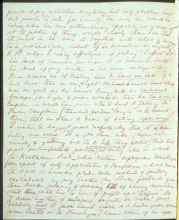
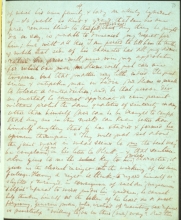
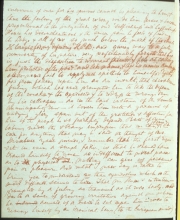
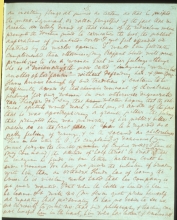
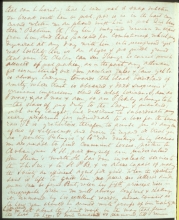

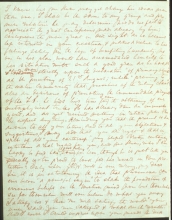
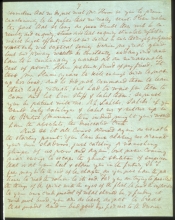
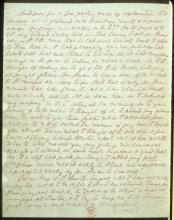

huffish means peevish or sulky.
de haut en bas (French) literally, "from top to bottom", is used to mean "with superiority or condescension."
boot-black refers to someone who shines shoes for a living.